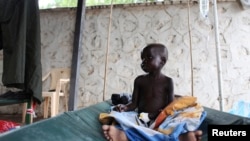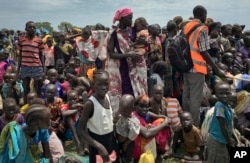The International Organization for Migration (IOM) is calling for rapid action to prevent a cholera epidemic in South Sudan from spiraling out of control as the rainy season in the country progresses.
More than 18,000 cases of cholera, including 328 deaths have been reported in South Sudan since June 2016. The International Organization for Migration warns the number of cases and deaths is likely to grow as the rainy season this year will leave as much as 60 percent of the country inaccessible by road.
IOM spokeswoman, Olivia Headon, tells VOA a combination of factors including the ongoing crisis, the rainy season and the movement of displaced people across the country is making it extremely difficult to contain this deadly disease.
“So, if you are maybe infected with cholera or someone in your family if you come in contact with this and then you move to a different part of the country, you are also bringing the infection with you," she said. "We hope that it does not spiral out of control and IOM with other partners in the U.N. and NGO [non-governmental organization] implementers on the ground are working so it does not.”
IOM reports the scale of needs in this conflict-ridden country is unprecedented, with more than 7.5 million people dependent on humanitarian aid. The agency says disease outbreaks, such as cholera, are particularly dangerous for displaced and vulnerable populations. This includes children under five, thousands of whom are severely acutely malnourished and at risk of dying without therapeutic help.
Headon says IOM and partners are leading oral cholera vaccination campaigns across South Sudan. She says they are distributing cholera kits, including jerry cans, water treatment supplies and soap. She says aid workers also are repairing boreholes and conducting hygiene promotion in cholera-affected areas across the country.







